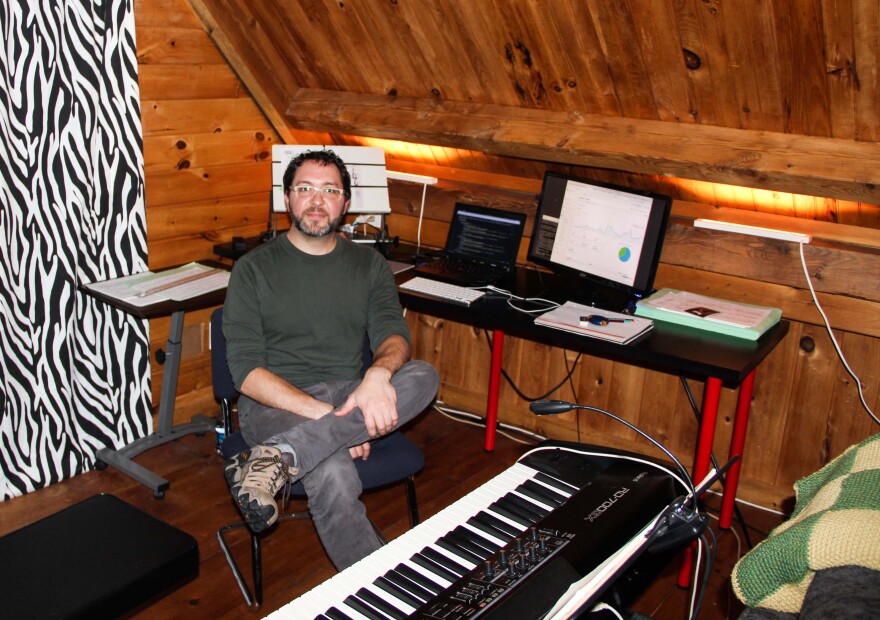What will the music of the future sound like? New Hampshire Composer Greg Wilder doesn't know yet, but as NHPR's Sean Hurley reports, the Warren resident is hoping to build the machine that writes it.
Greg Wilder and his wife Alison Conard are composers and computer programmers. Together in their log home in Warren they design websites for artists.
But music is at the heart of everything they do and music is the first thing Greg Wilder can remember.
"So I started music at the age of 3. I actually started playing piano at 3. It was something I was deeply obsessed with. I mean it was really all I did."
Wilder put himself through music school by playing in jazz bands. After graduating, he continued composing while supporting himself by playing anywhere he could, often finding himself improvising in musical languages he wasn't familiar with.
"That experience got me thinking a whole lot about how am I doing this? I'm able to intuit this but I don't even know how I'm doing it. There's got to be some rules I'm using to do it."
To find out what those rules might be Wilder wrote a simple software program that could analyze different pieces of music and discern their similarity. And quite by accident, Wilder found that he'd created a tool with commercial potential. Venture capital was found. A team was hired. And Clio was born.
"Clio was able to analyze millions of tracks of music and compare them all to determine which of those tracks are musically similar."
Although developing the similarity engine proved to be a kind of lost weekend to Wilder's larger goal, it provided him with a remarkable insight.
"I realized that so many people are just copying other people and not knowing it. There's so much of the same thing going on."
Somewhere, someone - and maybe many someones - were busy composing songs similar, for example, to Wilder's own Winter piece. The humbling conclusion stood in direct conflict to his goals as a composer.
"As a composer I'm always looking to expand and go up further to something new. That's what composers do, especially in the classical world. We try to shoot out where no man has gone before. "
It's hard for us to imagine this today, but in Beethoven's time so much of the music that he was producing was unimaginable to those folks at that time.
Was there a way, Wilder wondered, to devise software that could survey the entire musical landscape and find those places that hadn't yet been explored? Could he create, in a word, the machine equivalent of a Beethoven?
"And using machine learning techniques figure out which aspects make the pieces unique and by capturing the identifiable character the idea is to then create new music that might contain some of that magic dust."
Wilder sold Clio and set to work on his next project - Isomer. Over the last decade, Isomer has bloomed into a suite of tools that not only analyzes every aspect of a given musical piece but can ingest thousands of songs and create new music based on their forms.
As an example, Wilder starts up Isomer and lifts The Dictionary of Musical Themes off the coffee table.
"This is literally 10,000 musical themes. So I fed that into Isomer to start. Here is one of them, number 4119."
"And from that, I had the machine then create 10,000 new melodies."
"And now, this is the cool part..."
Wilder next has Isomer compare the 10,000 new themes with samples of music he most loves - Brahms, Beethoven and some of his own work.
"I fed that into Isomer and said - go find me melodies from this new library of generated tunes that are similar to the Brahms, the Beethoven, and the Wilder."
Almost all of the 10,000 new themes were discarded by the parameter, but a short list of candidate melodies emerged. Wilder selected one and then sent Isomer on its most complex task. To turn the selected melody into a full performance.
"This is what it came up with."
Wilder doesn't suggest that Isomer's music is particularly listenable. But he believes he's begun to blur the line that divides man-made from machine-made.
"I hope that I can live long enough to see the work through and to have the machine be creating music that no one knows is a machine."
And working alongside Isomer-
"I want to create the music of the future. Music that has not been imagined before."







